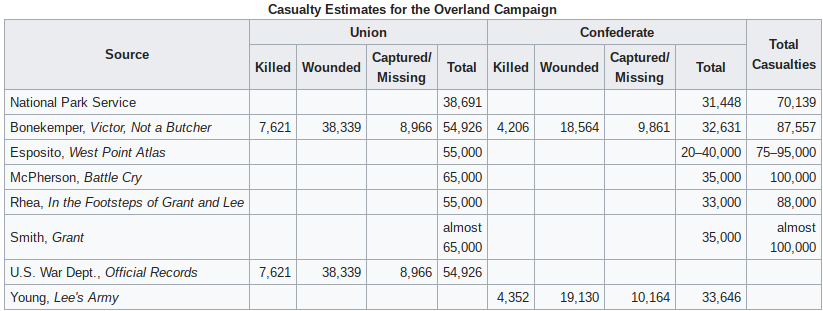Yes, estimates go up to 65,000. Actual records show 54,000. One of these is more reliable than the other.
I'm not saying Grant took 65,000 in losses, as all I've said is that his losses were near 60,000 and such cannot be denied.
Yes, due to the length of time the war was going on Lincoln was worried about losing the election. This is irrelevant.
Not at all, as to deny that the immense casualties suffered in the Overland Campaign did not have an impact on Northern morale is without merit.
At winning the war. Yes he didn't take Richmond or completely destroy Lee's army, but the entire campaign set in motion the events which resulted in both those events happening by April of the next year.
For one, you've just de-facto conceded the Overland Campaign was a failure. As to the actual root of your point, not really; Lee remained with an Army, the city and the means to keep it supplied. It was only thanks to Sherman that the War could be won, as Lincoln would've lost re-election.
Yes, and you will note Longstreet was promptly shot by his own men and his big attack accomplished precisely squat.
Except it forced Grant to abandon his position in favor of a movement to Spotsylvania, of course.
Subsequent Confederate attacks were repulsed as Hancock's Union forces had rallied. So again, no this is not a collapsed flank.
Hancock's line, in his own words, got rolled up. That they managed to recover is irrelevant in the face of that, as well as the fact Grant had to give up the battlefield in favor of better prospects elsewhere.
Except for the fact that Grant had carried a number of strong positions before, the hills of Chattanooga were considered to be impregnable and yet Grant seized the heights.
Indeed, and I could give him a pass for one or two notable examples, but instead he did or nearly did so multiple times in the campaign. That Lee was not Bragg should've been obvious, as was the fact Lee had repeatedly used such tactics before against Federal commanders to great effect.
This would be blatantly ignoring Meade's explosion at North Anna led to Grant returning operational and tactical control of the Army of the Potomac. Thus Meade had tactical control of the AoP during the Battle of Cold Harbor. In fact, Grant issued orders to Meade to conduct a reconnaissance before the June 3rd assault which both Meade and Hancock ignored.
Grant was still there, and outranked Meade; that he did not keep him on check and ensure his orders were followed is Grant's fault.
As for intelligence gathering, how would Grant know the condition of Lee's army? The BMI provided excellent intelligence on enemy movements and numbers but not the condition of the enemy. The only indicator of the enemy's condition was its performance in battle and on June 1st, the Army of the Potomac had a rather good day in fighting Lee's army.
Not carrying out the reconnaissance orders is primarily what I meant.
I am aware of Longstreet and Gordon's assaults. However, to say that the flanks collapsed is hyperbole. The article cited on Longstreet did not include the aftermath of Longstreet's assault. When Lee ordered Longstreet's Corps to resume its attack, it was beaten off by Hancock's troops in their trenches covering the Brock Road. Gordon's assault did hammer a division of the VI Corps in the flank, but the VI Corps did not collapse.
I'll grant you Gordon didn't cause a near route like Longstreet did, but the fact that the two assaults hit Grant in flanks and that Grant was then forced to withdraw is the telling bit of the encounter.
The only reason why the march was a comedy of errors was that the Army of the Potomac's staff failed to coordinate the commands into an offensive movement into Virginia.
As an army commander at the time, one of Grant's duties was to ensure such movements were carried as best as possible, up to and including doing staff work himself if needed. Bragg did such during the Kentucky Invasion, for example. Again, the fault rests with Grant ultimately.
Grant would have to be politically blind. Both Butler and Sigel were political clout, and had considerable political clout and relationships with Lincoln. Not to mention the fact that 1864 was an election year, Sigel was popular among German-American immigrants and Benjamin Butler was a favorite of the Radical Republicans and could not be denied a command role.
Fair enough, and I'll concede on this.
Except for the fact the modern consensus among historians is that the Army of the Potomac suffered roughly 55,000. Gordon Rhea's work on the Overland Campaign provided decisive evidence to show that this was the number.
55,000 is in the vicinity of 60,000, which as the size of Lee's army at the start of the campaign and this has been my point all along. I'm not arguing Grant took thousands of casualties more than what is generally accepted, just that this number is close to 60,000.
